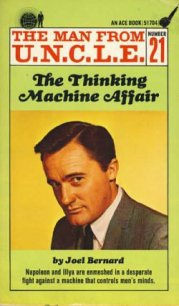The Phantom Tollbooth - Juster Norton (книги бесплатно читать без .TXT) 📗
“Then one day they had the most terrible quarrel of all. King Azaz insisted that words were far more significant than numbers and hence his kingdom was truly the greater, and the Mathemagician claimed that numbers were much more important than words and hence his kingdom was supreme. They discussed and debated and raved and ranted until they were on the verge of blows, when it was decided to submit the question to arbitration by the princesses.
“After days of careful consideration, in which all the evidence was weighed and all the witnesses heard, they made their decision:
“?‘Words and numbers are of equal value, for, in the cloak of knowledge, one is warp and the other woof. It is no more important to count the sands than it is to name the stars. Therefore, let both kingdoms live in peace.’
“Everyone was pleased with the verdict. Everyone, that is, but the brothers, who were beside themselves with anger.
“?‘What good are these girls if they cannot settle an argument in someone’s favor?’ they growled, since both were more interested in their own advantage than in the truth. ‘We’ll banish them from the kingdom forever.’
“And so they were taken from the palace and sent far away to the Castle in the Air, and they have not been seen since. That is why today, in all this land, there is neither Rhyme nor Reason.”
“And what happened to the two rulers?” asked Milo.
“Banishing the two princesses was the last thing they ever agreed upon, and they soon fell to warring with each other. Despite this, their own kingdoms have continued to prosper, but the old city of Wisdom has fallen into great disrepair, and there is no one to set things right. So, you see, until the princesses return, I shall have to stay here.”
“Maybe we can rescue them,” said Milo as he saw how sad the Which looked.
“Ah, that would be difficult,” she replied. “The Castle in the Air is far from here, and the one stairway which leads to it is guarded by fierce and black-hearted demons.”
Tock growled ominously, for he hated even the thought of demons.
“I’m afraid there’s not much a little boy and a dog can do,” she said, “but never you mind; it’s not so bad. I’ve grown quite used to it here. But you must be going or else you’ll waste the whole day.”
“Oh, we’re here for six million years,” sighed Milo, “and I don’t see any way to escape.”
“Nonsense,” scolded the Which, “you mustn’t take Officer Shrift so seriously. He loves to put people in prison, but he doesn’t care about keeping them there. Now just press that button in the wall and be on your way.”
Milo pressed the button and a door swung open, letting in a shaft of brilliant sunshine.
“Good-by; come again!” shouted the Which as they stepped outside and the door slammed shut.
Milo and Tock stood blinking in the bright light and, as their eyes became accustomed to it, the first things they saw were the king’s advisers again rushing toward them.
“Ah, there you are.”
“Where have you been?”
“We’ve been looking all over for you.”
“The Royal Banquet is about to begin.”
“Come with us.”
They seemed very agitated and out of breath as Milo walked along with them.
“But what about my car?” he asked.
“Don’t need it,” replied the duke.
“No use for it,” said the minister.
“Superfluous,” advised the count.
“Unnecessary,” stated the earl.
“Uncalled for,” cried the undersecretary. “We’ll take our vehicle.”
“Conveyance.”
“Rig.”
“Charabanc.”
“Chariot.”
“Buggy.”
“Coach.”
“Brougham.”
“Shandrydan,” they repeated quickly in order, and pointed to a small wooden wagon.
“Oh dear, all those words again,” thought Milo as he climbed into the wagon with Tock and the cabinet members. “How are you going to make it move? It doesn’t have a——”
“Be very quiet,” advised the duke, “for it goes without saying.”
And, sure enough, as soon as they were all quite still, it began to move quickly through the streets, and in a very short time they arrived at the royal palace.
7. The Royal Banquet
“Right this way.”
“Follow us.”
“Come along.”
“Step lively.”
“Here we go,” they shouted, hopping from the wagon and bounding up the broad marble stairway. Milo and Tock followed close behind. It was a strange-looking palace, and if he didn’t know better Milo would have said that it looked exactly like an enormous book, standing on end, with its front door in the lower part of the binding just where they usually place the publisher’s name.
Once inside, they hurried down a long hallway, which glittered with crystal chandeliers and echoed with their footsteps. The walls and ceiling were covered with mirrors, whose reflections danced dizzily along with them, and the footmen bowed coldly.
“We must be terribly late,” gasped the earl nervously as they reached the tall doors of the banquet hall.
It was a vast room, full of people loudly talking and arguing. The long table was carefully set with gold plates and linen napkins. An attendant stood behind each chair, and at the center, raised slightly above the others, was a throne covered in crimson cloth. Directly behind, on the wall, was the royal coat of arms, flanked by the flags of Dictionopolis.
Milo noticed many of the people he had seen in the market place. The letter man was busy explaining to an interested group the history of the W, and off in a corner the Humbug and the Spelling Bee were arguing fiercely about nothing at all. Officer Shrift wandered through the crowd, suspiciously muttering, “Guilty, guilty, they’re all guilty,” and, on noticing Milo, brightened visibly and commented in passing, “Is it six million years already? My, how time flies.”

Everyone seemed quite grumpy about having to wait for lunch, and they were all relieved to see the tardy guests arrive.
“Certainly glad you finally made it, old man,” said the Humbug, cordially pumping Milo’s hand. “As guest of honor you must choose the menu of course.”
“Oh my,” he thought, not knowing what to say.
“Be quick about it,” suggested the Spelling Bee. “I’m famished—f-a-m-i-s-h-e-d.”
As Milo tried to think, there was an ear-shattering blast of trumpets, entirely off key, and a page announced to the startled guests:
“KING AZAZ THE UNABRIDGED.”
The king strode through the door and over to the table and settled his great bulk onto the throne, calling irritably, “Places, everyone. Take your places.”
He was the largest man Milo had ever seen, with a great stomach, large piercing eyes, a gray beard that reached to his waist, and a silver signet ring on the little finger of his left hand. He also wore a small crown and a robe with the letters of the alphabet beautifully embroidered all over it.
“What have we here?” he said, staring down at Tock and Milo as everyone else took his place.

“If you please,” said Milo, “my name is Milo and this is Tock. Thank you very much for inviting us to your banquet, and I think your palace is beautiful.”

“Exquisite,” corrected the duke.
“Lovely,” counseled the minister.
“Handsome,” recommended the count.
“Pretty,” hinted the earl.
“Charming,” submitted the undersecretary.
“SILENCE,” suggested the king. “Now, young man, what can you do to entertain us? Sing songs? Tell stories? Compose sonnets? Juggle plates? Do tumbling tricks? Which is it?”
“I can’t do any of those things,” admitted Milo.

“What an ordinary little boy,” commented the king. “Why, my cabinet members can do all sorts of things. The duke here can make mountains out of molehills. The minister splits hairs. The count makes hay while the sun shines. The earl leaves no stone unturned. And the undersecretary,” he finished ominously, “hangs by a thread. Can’t you do anything at all?”




